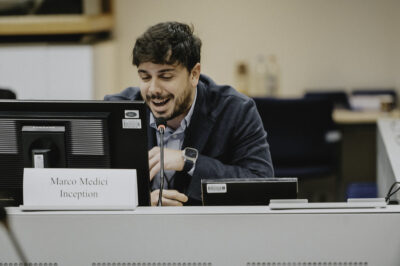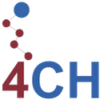The 4CH Final Meeting took place in Brussels on November 28-29, 2023, marking a significant milestone for the project. Hosted at the Conference Centre Albert Borschette, the event brought together stakeholders, experts, and project contributors to assess and celebrate the outcomes achieved over the project’s duration.
Day 1, which was themed “4CH at work”, started with an inspiring address by Rehana Schwinninger-Ladak who emphasised the European Commission’s commitment to digital transformation in culture and education, setting a visionary tone for the discussions.
Afterwards, Francesco Taccetti, the INFN Project Coordinator, provided a comprehensive introduction to the 4CH project. He outlined its objectives, achievements, and the formal launch of the Competence Centre. This session gave a clear picture of how the project aims to revolutionise cultural heritage preservation. Additionally, Franco Niccolucci and Roberto Di Giulio, offered insights into the technological achievements of the project and its collaborative efforts, particularly in relation to Ukraine and the activities carried out by the project to archive and preserve its cultural and digital heritage. They also highlighted the network and services implemented, underlining the project’s impact.
The rest of the morning sessions delved into the technical aspects of the 4CH cloud and its services. A special focus was on the Knowledge Base (KB) methodology, with practical demonstrations illustrating its utility in cultural heritage digitisation.

Marco Medici engages in the 4CH discussion
The presentation of the Pilot cases clearly demonstrated the importance and potential of using and integrating different technologies, such as 3D and BIM, for the digitisation and conservation of tangible and intangible cultural heritage, including its complex documentation.
In the afternoon the focus shifted to education and training. The sessions showcased the TwiniT webinars which explore aspects of storing, managing, and visualising 3D models and engaged in a thorough discussion on the infrastructure and governance of the Competence Centre, emphasising the importance of upskilling for digital heritage management. Francesco Taccetti provided the closing remarks, summarising the day’s discussions and laying the groundwork for the upcoming sessions.
The second day delved into further details regarding the Competence Centre’s infrastructure and governance, culminating in a wrap-up of the TwinIt webinar series.
